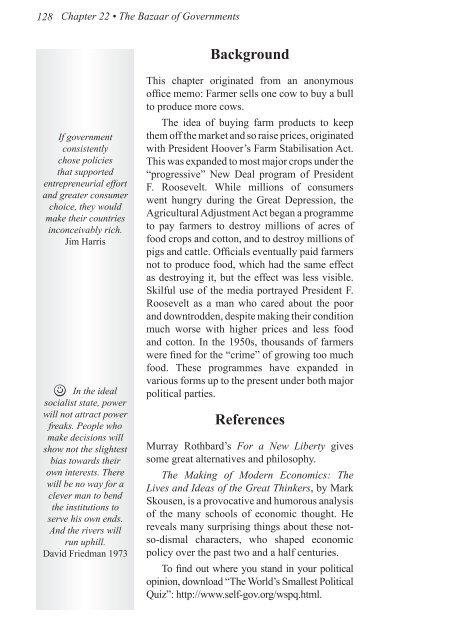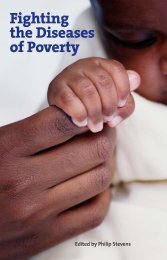The Adventures of Jonathan Gullible - Bastiat Institute
The Adventures of Jonathan Gullible - Bastiat Institute
The Adventures of Jonathan Gullible - Bastiat Institute
Create successful ePaper yourself
Turn your PDF publications into a flip-book with our unique Google optimized e-Paper software.
128 Chapter 22 • <strong>The</strong> Bazaar <strong>of</strong> Governments<br />
If government<br />
consistently<br />
chose policies<br />
that supported<br />
entrepreneurial effort<br />
and greater consumer<br />
choice, they would<br />
make their countries<br />
inconceivably rich.<br />
Jim Harris<br />
? In the ideal<br />
socialist state, power<br />
will not attract power<br />
freaks. People who<br />
make decisions will<br />
show not the slightest<br />
bias towards their<br />
own interests. <strong>The</strong>re<br />
will be no way for a<br />
clever man to bend<br />
the institutions to<br />
serve his own ends.<br />
And the rivers will<br />
run uphill.<br />
David Friedman 1973<br />
Background<br />
This chapter originated from an anonymous<br />
<strong>of</strong>fi ce memo: Farmer sells one cow to buy a bull<br />
to produce more cows.<br />
<strong>The</strong> idea <strong>of</strong> buying farm products to keep<br />
them <strong>of</strong>f the market and so raise prices, originated<br />
with President Hoover’s Farm Stabilisation Act.<br />
This was expanded to most major crops under the<br />
“progressive” New Deal program <strong>of</strong> President<br />
F. Roosevelt. While millions <strong>of</strong> consumers<br />
went hungry during the Great Depression, the<br />
Agricultural Adjustment Act began a programme<br />
to pay farmers to destroy millions <strong>of</strong> acres <strong>of</strong><br />
food crops and cotton, and to destroy millions <strong>of</strong><br />
pigs and cattle. Offi cials eventually paid farmers<br />
not to produce food, which had the same effect<br />
as destroying it, but the effect was less visible.<br />
Skilful use <strong>of</strong> the media portrayed President F.<br />
Roosevelt as a man who cared about the poor<br />
and downtrodden, despite making their condition<br />
much worse with higher prices and less food<br />
and cotton. In the 1950s, thousands <strong>of</strong> farmers<br />
were fi ned for the “crime” <strong>of</strong> growing too much<br />
food. <strong>The</strong>se programmes have expanded in<br />
various forms up to the present under both major<br />
political parties.<br />
References<br />
Murray Rothbard’s For a New Liberty gives<br />
some great alternatives and philosophy.<br />
<strong>The</strong> Making <strong>of</strong> Modern Economics: <strong>The</strong><br />
Lives and Ideas <strong>of</strong> the Great Thinkers, by Mark<br />
Skousen, is a provocative and humorous analysis<br />
<strong>of</strong> the many schools <strong>of</strong> economic thought. He<br />
reveals many surprising things about these notso-dismal<br />
characters, who shaped economic<br />
policy over the past two and a half centuries.<br />
To fi nd out where you stand in your political<br />
opinion, download “<strong>The</strong> World’s Smallest Political<br />
Quiz”: http://www.self-gov.org/wspq.html.





![[June 2008, Volume V Quarterly Issue] Pdf File size - The IIPM Think ...](https://img.yumpu.com/31747104/1/190x245/june-2008-volume-v-quarterly-issue-pdf-file-size-the-iipm-think-.jpg?quality=85)
